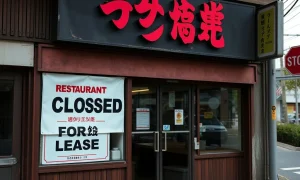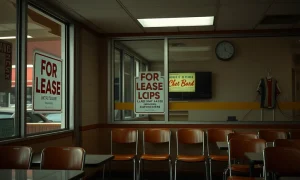The landscape of the restaurant industry is constantly evolving. Companies must adapt to survive and thrive. Recently, a major development has shaken the fast-casual segment. Noodles & Company announced significant changes to its operational structure. This includes the planned **Noodles & Company closures** of dozens of its restaurants. This strategic move aims to improve the company’s financial performance. Furthermore, CEO Drew Madsen is stepping down from his leadership role. This dual announcement marks a critical juncture for the popular chain. It signals a decisive shift in its strategic direction.
Understanding the Scope of Noodles & Company Closures
Noodles & Company has identified a specific number of underperforming locations for closure. These closures are not random decisions. Instead, they are part of a targeted effort. The company aims to enhance its overall profitability. Therefore, this strategic consolidation will allow resources to be reallocated. Funds will shift towards more successful and higher-potential units. Management believes this focused approach is absolutely essential. It will strengthen the brand’s long-term financial health. The closures reflect a pragmatic response to current market conditions. They prioritize efficiency and sustainable growth. This decision impacts multiple states and regions where these restaurants operate.
The company has openly stated the rationale behind these closures. They cited several key factors:
- Low foot traffic: Certain locations simply did not attract enough customers consistently.
- High operating costs: Elevated rents or labor expenses made some restaurants unprofitable.
- Market saturation: Too many restaurants in close proximity diluted sales for existing units.
- Consistent Underperformance: These locations showed negative financial results over time.
Ultimately, these locations were deemed non-viable. The company must make tough choices. It seeks to optimize its restaurant portfolio. This strategy is common in the competitive food service sector. It ensures a leaner, more effective operation for the future.
Financial Performance Driving the Noodles & Company Closures
The decision to initiate **Noodles & Company closures** follows a period of mixed financial results. Recent earnings reports have highlighted significant challenges. For instance, the company experienced declining same-store sales in some key markets. This trend indicated a struggle to attract and retain customers effectively. Rising operational costs also significantly impacted profit margins. Labor expenses, for example, have steadily increased across the industry. Furthermore, food costs presented persistent challenges. These factors combined to put immense pressure on the company’s bottom line. Consequently, the leadership team concluded that a substantial restructuring was necessary. They needed to address these financial headwinds directly. The closures represent a bold step. They aim to return the company to a path of consistent profitability. Investors and analysts will closely watch the impact of these changes. They seek clear signs of financial improvement.
The company’s latest financial disclosures reveal key figures. These figures underscore the urgent need for change. Net income has fluctuated significantly in recent quarters. Overall revenue growth has slowed considerably. These indicators painted a clear picture. Certain segments of the business were simply not performing. This put a strain on the entire organization. Therefore, the strategic decision to reduce the restaurant footprint emerged. It became a necessary measure. This action allows the company to focus its investments. It can now direct capital towards initiatives that promise higher returns. This includes technological upgrades and menu innovation. It also involves targeted marketing efforts in stronger markets.
Leadership Transition Amidst Strategic Realignment
Drew Madsen, the outgoing CEO, played a pivotal role during his tenure. He navigated the company through various market shifts and challenges. His departure coincides directly with this major restructuring announcement. This timing suggests a desire for fresh leadership. New perspectives are often sought during significant corporate transformations. Dave Boennighausen, the current Chief Financial Officer (CFO), will assume the role of interim CEO. This transition aims to ensure leadership continuity during a critical period. The board of directors expressed full confidence in Boennighausen’s capabilities. He brings extensive financial expertise to his new role. His deep understanding of the company’s finances will be invaluable. He must guide Noodles & Company through this critical period. His immediate priorities will likely include:
- Stabilizing operations and mitigating the impact of the closures.
- Executing the new strategic plan efficiently.
- Maintaining employee morale and ensuring a smooth transition.
- Reassuring investors and key stakeholders about the company’s future.
This leadership change signals a commitment to decisive action. The company is not shying away from difficult choices. Instead, it is embracing them proactively. It seeks to position itself for future success. The new leadership will focus intently on efficiency and profitability.
Strategic Pivot: Beyond Just Noodles & Company Closures
The company’s strategy extends beyond simply closing underperforming stores. Noodles & Company plans a comprehensive strategic pivot. This involves a renewed focus on its core, high-performing markets. It will also heavily invest in digital ordering platforms. This includes enhancing its mobile app functionality. It also means expanding partnerships with third-party delivery services. Improving the overall customer experience is another top priority. This encompasses faster service and continuous menu innovation. These initiatives aim to drive future growth. They will also significantly improve operational efficiency. The goal is to create a more resilient and adaptable business model. This will allow the company to thrive in a highly competitive landscape.
Key aspects of this strategic pivot include:
- Digital Transformation: Upgrading online ordering systems and developing robust loyalty programs.
- Menu Innovation: Introducing new dishes that cater to evolving tastes and dietary needs, like plant-based options.
- Operational Streamlining: Implementing new technologies to improve kitchen efficiency and service speed, reducing wait times.
- Targeted Marketing: Focusing promotional efforts on high-performing markets and valuable customer segments.
These proactive steps demonstrate the company’s commitment. It seeks to reinvent itself effectively. It aims to remain relevant to today’s consumers. The leadership believes these changes will lay a strong foundation. They will ensure sustained growth in the years to come. Ultimately, this comprehensive approach targets long-term viability.
Impact on Employees, Customers, and Communities
The **Noodles & Company closures** will inevitably affect many dedicated employees. The company has publicly stated its commitment. It will support affected staff members during this difficult transition. This support includes offering severance packages. It also involves providing assistance with job placement. Furthermore, they are exploring opportunities for internal transfers to other active locations. This aims to minimize the impact on their valuable workforce. The company acknowledges the difficulty of these decisions. It prioritizes a smooth and supportive transition for its valued team members. Communication with staff is ongoing.
For customers, the closures mean fewer dining options in some specific areas. However, the vast majority of Noodles & Company locations will continue to operate as usual. The brand remains deeply committed to its loyal customer base. It will maintain its beloved menu offerings and high-quality standards. Customers can still enjoy their favorite pasta dishes, salads, and soups. The company encourages patrons to visit its official website or use their mobile app. They can find information on active locations nearest to them. The goal is to ensure minimal disruption for patrons. It also aims to maintain a strong presence where the brand performs best. Communities impacted by closures will see vacant storefronts. However, the overall strategy aims to create a healthier company. This ultimately benefits all stakeholders in the long run.
The Broader Restaurant Industry Landscape
Noodles & Company is certainly not alone in facing these profound challenges. Many restaurant chains are navigating a tough and unpredictable economic climate. Inflation continues to impact consumer spending power significantly. Supply chain issues also persist, affecting ingredient availability and costs for operators. Therefore, businesses across the sector must make difficult decisions. They must constantly optimize their portfolios to remain competitive. This frequently involves closing unprofitable stores. This trend highlights a crucial need for agility. Companies must respond quickly and decisively to market shifts. The fast-casual dining sector, in particular, is highly competitive. Consumers have an abundance of choices today. Changing dietary preferences also play a significant role. Health-conscious options and plant-based alternatives are gaining popularity. Noodles & Company, like its peers, must adapt to these evolving trends. It needs to innovate its menu. It also needs to enhance its service model consistently.
The industry is seeing a clear trend. Operators are focusing heavily on efficiency and technology to drive growth. Many are investing in:
- Digital ordering: Streamlining the ordering process through apps and online platforms.
- Delivery services: Expanding reach beyond traditional dine-in with third-party partnerships.
- Ghost kitchens: Reducing overhead by operating without a public storefront for delivery-only.
- Labor optimization: Utilizing technology to manage staff more effectively and reduce costs.
These strategies help companies remain competitive. They also help to manage costs effectively in a high-pressure environment. The **Noodles & Company closures** reflect this broader industry shift. It is a calculated move towards a more sustainable and profitable future for the brand.
Future Outlook for Noodles & Company
The announcement of **Noodles & Company closures** and CEO departure marks a significant turning point. It reflects the ongoing challenges within the restaurant industry. However, it also signals a proactive stance by the company’s leadership. The company is taking decisive steps. It aims to secure its long-term viability. Its future success will heavily depend on strategic execution. It also depends on its ability to adapt swiftly to evolving market demands. The goal is to emerge as a leaner, more focused, and ultimately more profitable enterprise. This strategic realignment is a bold bet on the future. It underscores the dynamic nature of the food service business. The company is committed to rebuilding its foundation. It seeks to deliver enhanced value to its customers and shareholders alike.
This restructuring could position Noodles & Company for a stronger comeback. A smaller, more efficient footprint may lead to improved financial performance. The renewed focus on digital platforms and menu innovation could attract new customers. It could also retain existing ones more effectively. The leadership transition provides an opportunity. It allows for fresh perspectives and renewed energy at the top. Only time will tell the full impact of these comprehensive changes. However, the company is clearly taking aggressive measures. It aims to navigate the complexities of today’s market successfully and build a resilient brand.
Frequently Asked Questions (FAQs)
Why is Noodles & Company closing restaurants?
Noodles & Company is closing restaurants primarily due to underperformance. These locations often experienced low customer traffic, high operating costs, or market saturation. The closures are a strategic move to improve the company’s overall profitability and focus resources on stronger units.
How many Noodles & Company locations are closing?
The company announced plans to close dozens of its underperforming restaurant locations. The exact number may vary as the restructuring progresses, but it represents a significant portion of its less profitable stores within their portfolio.
Who is the new CEO of Noodles & Company?
Drew Madsen is stepping down as CEO. Dave Boennighausen, the current Chief Financial Officer (CFO), will serve as the interim CEO. He will lead the company through this period of strategic realignment and operational adjustments.
How will these Noodles & Company closures affect employees?
Noodles & Company has stated its commitment to supporting affected employees. This includes offering severance packages, assistance with job placement, and exploring opportunities for internal transfers to other active locations where possible to minimize disruption.
What is Noodles & Company’s strategy for future growth?
Beyond the closures, Noodles & Company plans a strategic pivot. This involves focusing on core markets, investing heavily in digital ordering platforms, enhancing the customer experience, and introducing menu innovations to meet evolving consumer preferences and market demands.
Can I still find Noodles & Company restaurants open near me?
Yes, the majority of Noodles & Company locations will remain open and operational. The closures are targeted at specific underperforming stores. Customers can visit the official Noodles & Company website or use their app to find active restaurants near them and confirm operating hours.
























